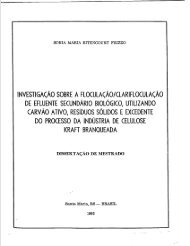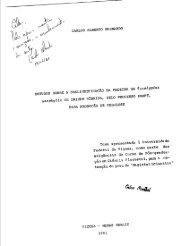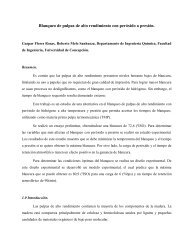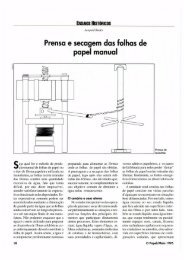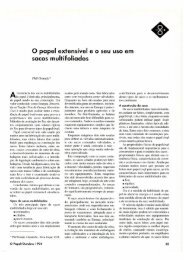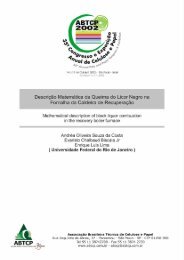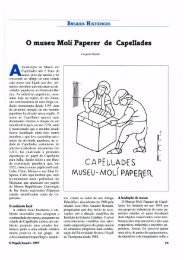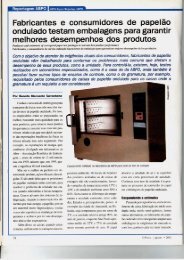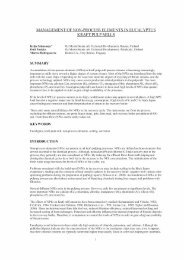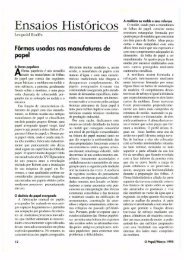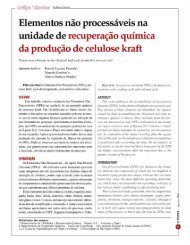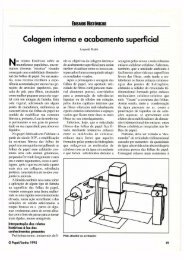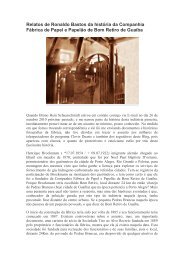O Eucalipto: um século no Brasil (The Eucalypt - Celso Foelkel
O Eucalipto: um século no Brasil (The Eucalypt - Celso Foelkel
O Eucalipto: um século no Brasil (The Eucalypt - Celso Foelkel
You also want an ePaper? Increase the reach of your titles
YUMPU automatically turns print PDFs into web optimized ePapers that Google loves.
A S U S T E N T A B I L I D A D E D A S F L O R E S T A S - F O R E S T S U S T A I N A B I L I T Y<br />
73<br />
Ao contrário do que dizem os detratores do eucalipto, <strong>no</strong> <strong>Brasil</strong> ele não se sustenta,<br />
sem auxílio do homem. Como outras plantas de origem exótica como o cafeeiro, a<br />
cana-de-açúcar e a soja, que se tornaram os principais produtos agrícolas brasileiros,<br />
se <strong>um</strong>a plantação florestal de eucalipto for abandonada, ela perece, é vencida pela<br />
mata nativa que rebrota e, em poucas décadas, o eucalipto desaparecerá.<br />
Essa afirmação é do chefe do Departamento de Ciências Florestais da ESALQ, professor Fabio<br />
Poggiani. A comprovação da afirmativa é o “Parque das Neblinas”, <strong>um</strong>a área originalmente<br />
de Mata Atlântica <strong>no</strong> alto da Serra do Mar, perto de Mogi das Cruzes. Na época em<br />
que o gover<strong>no</strong> ofereceu incentivos fiscais para o reflorestamento, nas décadas de 1960/70,<br />
<strong>um</strong> grande cultivo de eucalipto ocupou a região mas, posteriormente, já com o eucaliptal<br />
desenvolvido, a área foi abandonada.<br />
Aos poucos, brotou do solo <strong>um</strong> sub-bosque de árvores nativas que o eucalipto não impede que<br />
surjam, embaúbas, palmeiras, samambaiuçús <strong>no</strong>s terre<strong>no</strong>s mais úmidos e, posteriormente,<br />
manacás, jequitibás e perobas. Hoje, é difícil caminhar <strong>no</strong> meio da floresta nativa, onde os altos<br />
eucaliptos vão envelhecendo, sem re<strong>no</strong>vação, por não se reproduzirem. É a mesma situação do<br />
Horto de Rio Claro, atual Floresta Estadual Edmundo Navarro de Andrade, onde os talhões de<br />
diversas espécies de eucaliptos plantados por Navarro de Andrade em 1904 e jamais cortados,<br />
apresentam <strong>um</strong> pujante sub-bosque onde só é possível penetrar com facão de mato.<br />
Unlike propagated by eucalypt detractors, it does <strong>no</strong>t support itself in Brazil<br />
without h<strong>um</strong>an assistance. As is the case of other exotic plants, such as coffee,<br />
sugar cane and soy, which became the main Brazilian crops, if a eucalypt<br />
plantation is abandoned, it dies and is overcome by the native forest which resurfaces<br />
and in but a few decades, eucalypt disappears.<br />
This statement was made by the head of Departamento de Ciências Florestais da<br />
ESALQ/USP, professor Fabio Poggiani. Proof of this is the “Parque das Neblinas” (Fog<br />
Park), originally part of Mata Atlântica area tucked away on the top of the Serra do<br />
Mar mountains, near Mogi das Cruzes. When the government offered fiscal incentives<br />
for reforestation, in the 1960/70’s, a large eucalypt plantation effort covered the region<br />
but later, after the plantation had developed, the area was abandoned.<br />
A understory of native trees, which eucalypt does <strong>no</strong>t keep from growing, slowly appeared<br />
in the site, among which embaúbas, palm trees, and samambaiuçús on the moister land<br />
and, later, manacás, jequitibás and perobas. Nowadays, it is hard to get around in the<br />
midst of the native forest, where the tall eucalypt trees are getting old, <strong>no</strong>n-re<strong>no</strong>vated<br />
because they don’t reproduce. <strong>The</strong> same has taken place at the Rio Claro, where stands of<br />
several eucalypts species Navarro de Andrade planted in 1904 and were never cut, present<br />
a thriving sub-forest one can only penetrate using a forest knife.




